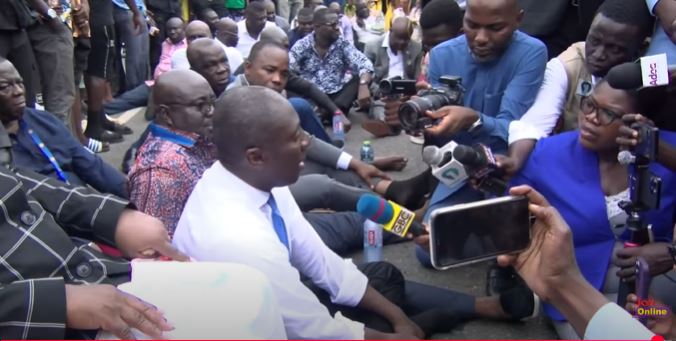Justice, equality, and fairness are fundamental principles in any democratic society. These values ensure that all individuals are treated equally, regardless of their social, economic, or political status. The proverb “People who live in glass houses shouldn’t throw stones” emphasizes the idea that individuals who are flawed should not criticize others, as it may expose their own shortcomings.
The recent arrest and subsequent protests surrounding Bernard Antwi Boasiako, also known as Chairman Wontumi, the Ashanti Regional Chairman of the ruling New Patriotic Party (NPP), have sparked significant debate on accountability, the rule of law, and the political landscape in Ghana. The protests, led by members of the Minority Caucus in Parliament, raise important questions about political solidarity, the integrity of state institutions, and the influence of politics on judicial processes.
Wontumi has been accused of various financial irregularities, including fraud, causing financial loss to the state, and money laundering. The investigations are said to be linked to an international organized crime scheme, highlighting the seriousness of the allegations against him. In a democratic society, individuals accused of such crimes must be held accountable, especially when public trust and state resources are at stake.
Accountability is a crucial aspect of democracy, requiring individuals in positions of power to answer for their actions. The question arises: should political party leaders support an individual solely based on party affiliation, regardless of the severity of the allegations against them? Upholding public trust depends on allowing due process to unfold without interference from political actors.
The protest staged by Minority MPs in support of Wontumi demonstrates both political solidarity within a party and concerns about respecting legal processes that uphold the rule of law. In a functioning democracy, lawmakers should prioritize legal structures and norms that ensure justice, even when a fellow party member faces serious allegations.
While protests can be a tool for nonviolent expression and advocacy for change, using protests to challenge the legal system sets a dangerous precedent. It raises the question of whether the protests aim to highlight a potential miscarriage of justice or exert political pressure to influence outcomes for a party ally.
The importance of adhering to laws governing public demonstrations, such as the Public Order Act in Ghana, is crucial. Public servants, including Members of Parliament, have an obligation to abide by laws while advocating for their constituents. Disregarding legal protocols during protests can undermine public trust and suggest that political elites are above accountability.
The ongoing situation involving Wontumi’s detention and the protests underscores the need for greater accountability and transparency in Ghana’s political system. Upholding the rule of law should take precedence over political allegiance, and every citizen, especially those in leadership positions, must respect it.
In conclusion, the Wontumi case highlights the importance of allowing the legal process to unfold without political interference. All individuals, regardless of their status, must be held accountable under the law. Let us trust in the legal system to deliver justice and ensure that no one is above the law.








